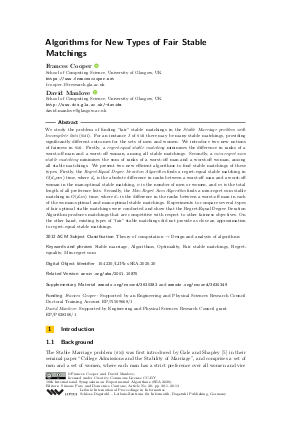Algorithms for New Types of Fair Stable Matchings
Authors
Frances Cooper  ,
David Manlove
,
David Manlove 
-
Part of:
Volume:
18th International Symposium on Experimental Algorithms (SEA 2020)
Part of: Series: Leibniz International Proceedings in Informatics (LIPIcs)
Part of: Conference: International Symposium on Experimental Algorithms (SEA) - License:
 Creative Commons Attribution 3.0 Unported license
Creative Commons Attribution 3.0 Unported license
- Publication Date: 2020-06-12
File

PDF
LIPIcs.SEA.2020.20.pdf
- Filesize: 0.56 MB
- 13 pages
Document Identifiers
Related Versions
Subject Classification
ACM Subject Classification
- Theory of computation → Design and analysis of algorithms
Keywords
- Stable marriage
- Algorithms
- Optimality
- Fair stable matchings
- Regret-equality
- Min-regret sum
Metrics
- Access Statistics
-
Total Accesses (updated on a weekly basis)
0Document
0Metadata
Abstract
We study the problem of finding "fair" stable matchings in the Stable Marriage problem with Incomplete lists (SMI). For an instance I of SMI there may be many stable matchings, providing significantly different outcomes for the sets of men and women. We introduce two new notions of fairness in SMI. Firstly, a regret-equal stable matching minimises the difference in ranks of a worst-off man and a worst-off woman, among all stable matchings. Secondly, a min-regret sum stable matching minimises the sum of ranks of a worst-off man and a worst-off woman, among all stable matchings. We present two new efficient algorithms to find stable matchings of these types. Firstly, the Regret-Equal Degree Iteration Algorithm finds a regret-equal stable matching in O(d₀ nm) time, where d₀ is the absolute difference in ranks between a worst-off man and a worst-off woman in the man-optimal stable matching, n is the number of men or women, and m is the total length of all preference lists. Secondly, the Min-Regret Sum Algorithm finds a min-regret sum stable matching in O(d_s m) time, where d_s is the difference in the ranks between a worst-off man in each of the woman-optimal and man-optimal stable matchings. Experiments to compare several types of fair optimal stable matchings were conducted and show that the Regret-Equal Degree Iteration Algorithm produces matchings that are competitive with respect to other fairness objectives. On the other hand, existing types of "fair" stable matchings did not provide as close an approximation to regret-equal stable matchings.
Cite As Get BibTex
Frances Cooper and David Manlove. Algorithms for New Types of Fair Stable Matchings. In 18th International Symposium on Experimental Algorithms (SEA 2020). Leibniz International Proceedings in Informatics (LIPIcs), Volume 160, pp. 20:1-20:13, Schloss Dagstuhl – Leibniz-Zentrum für Informatik (2020)
https://doi.org/10.4230/LIPIcs.SEA.2020.20
BibTex
@InProceedings{cooper_et_al:LIPIcs.SEA.2020.20,
author = {Cooper, Frances and Manlove, David},
title = {{Algorithms for New Types of Fair Stable Matchings}},
booktitle = {18th International Symposium on Experimental Algorithms (SEA 2020)},
pages = {20:1--20:13},
series = {Leibniz International Proceedings in Informatics (LIPIcs)},
ISBN = {978-3-95977-148-1},
ISSN = {1868-8969},
year = {2020},
volume = {160},
editor = {Faro, Simone and Cantone, Domenico},
publisher = {Schloss Dagstuhl -- Leibniz-Zentrum f{\"u}r Informatik},
address = {Dagstuhl, Germany},
URL = {https://drops.dagstuhl.de/entities/document/10.4230/LIPIcs.SEA.2020.20},
URN = {urn:nbn:de:0030-drops-120945},
doi = {10.4230/LIPIcs.SEA.2020.20},
annote = {Keywords: Stable marriage, Algorithms, Optimality, Fair stable matchings, Regret-equality, Min-regret sum}
}
Author Details
Funding
- Cooper, Frances: Supported by an Engineering and Physical Sciences Research Council Doctoral Training Account EP/N509668/1
- Manlove, David: Supported by Engineering and Physical Sciences Research Council grant EP/P028306/1
Supplementary Materials
References
-
D.J. Abraham, R.W. Irving, and D.F. Manlove. Two algorithms for the Student-Project allocation problem. Journal of Discrete Algorithms, 5(1):79-91, 2007.

-
P. Biró, J. van de Klundert, D. Manlove, W. Pettersson, T. Andersson, L. Burnapp, P. Chromy, P. Delgado, P. Dworczak, B. Haase, A. Hemke, R. Johnson, X. Klimentova, D. Kuypers, A. Nanni Costa, B. Smeulders, F. Spieksma, M.O. Valentín, and A. Viana. Modelling and optimisation in european kidney exchange programmes. European Journal of Operational Research, 13(4):1-10, 2019.

- F. Cooper and D.F. Manlove. Algorithms for new types of fair stable matchings. Technical Report 2001.10875, Computing Research Repository, Cornell University Library, 2020. Available from URL: https://arxiv.org/abs/2001.10875.
-
T. Feder. Stable Networks and Product Graphs. PhD thesis, Stanford University, 1990. Published in Memoirs of the American Mathematical Society, vol. 116, no. 555, 1995.

-
D. Gale and L.S. Shapley. College admissions and the stability of marriage. American Mathematical Monthly, 69:9-15, 1962.

-
D. Gale and M. Sotomayor. Some remarks on the stable matching problem. Discrete Applied Mathematics, 11:223-232, 1985.

-
S. Gupta, S. Roy, S. Saurabh, and M. Zehavi. Balanced stable marriage: How close is close enough? In Proceedings of WADS '19: the 16th Algorithms and Data Structures Symposium, Lecture Notes in Computer Science, pages 423-437. Springer, 2019.

-
D. Gusfield. Three fast algorithms for four problems in stable marriage. SIAM Journal on Computing, 16(1):111-128, 1987.

-
D. Gusfield and R.W. Irving. The Stable Marriage Problem: Structure and Algorithms. MIT Press, 1989.

-
R.W. Irving and P. Leather. The complexity of counting stable marriages. SIAM Journal on Computing, 15(3):655-667, 1986.

-
R.W. Irving, P. Leather, and D. Gusfield. An efficient algorithm for the "optimal" stable marriage. Journal of the ACM, 34(3):532-543, 1987.

-
A. Kato. Complexity of the sex-equal stable marriage problem. Japan Journal of Industrial and Applied Mathematics, 10:1-19, 1993.

-
D.E. Knuth. Mariages Stables. Les Presses de L'Université de Montréal, 1976. English translation in Stable Marriage and its Relation to Other Combinatorial Problems, volume 10 of CRM Proceedings and Lecture Notes, American Mathematical Society, 1997.

-
D.F. Manlove. Algorithmics of Matching Under Preferences. World Scientific, 2013.

-
E. McDermid and R.W. Irving. Sex-equal stable matchings: Complexity and exact algorithms. Algorithmica, 68:545-570, 2014.

-
E. Peranson and R.R. Randlett. The NRMP matching algorithm revisited: Theory versus practice. Academic Medicine, 70(6):477-484, 1995.

-
O. Tange. GNU parallel - the command-line power tool. The USENIX Magazine, pages 42-47, 2011.

